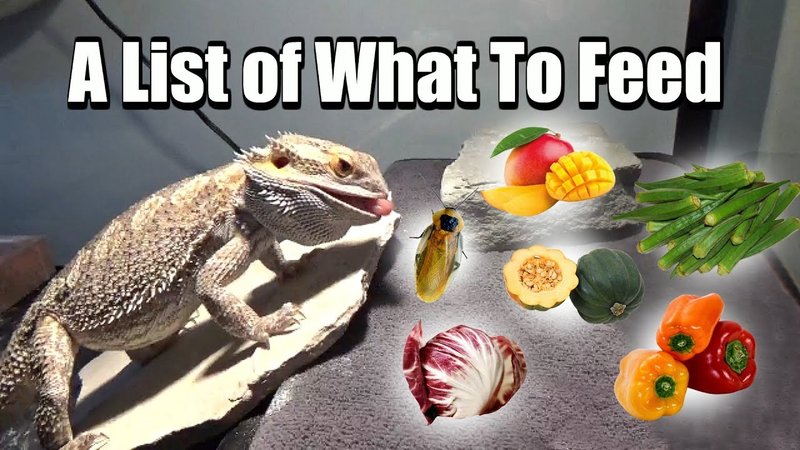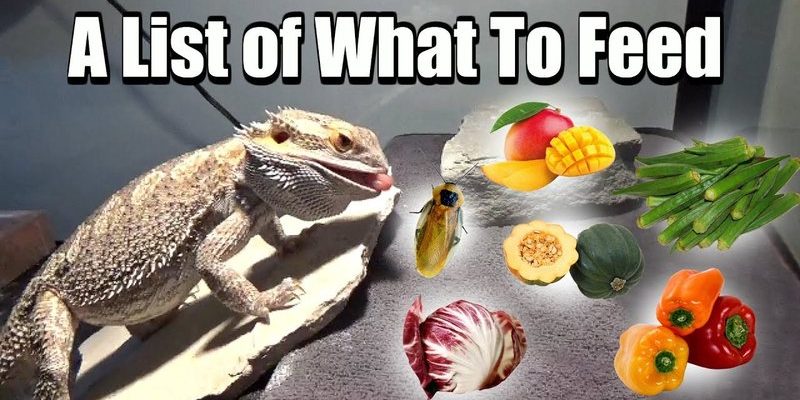
Feeding your bearded dragon the right food isn’t just about keeping it healthy; it’s about ensuring it thrives and stays active. Maybe you’ve heard terms like “gut loading” and “calcium dusting” thrown around, and you’re not quite sure what they mean. No worries! We’ll break it down step by step, so you can feel confident that you’re providing the best for your scaly friend. Let’s dive into the best foods for bearded dragons based on their age, from those tiny hatchlings to full-grown adults.
Understanding Bearded Dragon Diets
Before we explore the specific foods, it’s important to understand what makes a bearded dragon’s diet unique. These lizards are omnivores, which means they eat a mix of both plants and animals. However, their nutritional needs vary significantly throughout their life stages.
Young bearded dragons, or juveniles, typically require a higher protein intake to support their rapid growth. This means more insects and fewer greens. As they mature into adults, their diet shifts towards a higher percentage of vegetables and fruit, which helps maintain their health and vitality. So, when you think about feeding your bearded dragon, just remember: what they need at five months is different from what they need at five years.
The key elements you’ll want to include are protein, calcium, and a variety of vegetables. It’s like preparing a balanced meal for family—everyone has their preferences and requirements to stay healthy. Now, let’s break it down by age!
Best Foods for Juvenile Bearded Dragons (0-6 Months)
When it comes to juvenile bearded dragons, they’re like ravenous little teenagers, needing plenty of food to fuel their growth. Their diet should be rich in protein.
- Crickets: These are a staple, packed with protein and super easy to find. Be sure to use smaller crickets that are no longer than the space between their eyes.
- Dubia Roaches: They’re a fantastic alternative to crickets, being more nutritious and less stinky!
- Mealworms: Great for variety, but keep them limited due to their high-fat content.
- Leafy Greens: Offer small amounts of greens like collard greens or dandelion leaves for fiber and hydration. Think of greens as the side dish to the main course of insects!
Be sure to gut load your insects before feeding them to your dragon. This means feeding the insects nutritious food 24 hours before offering them to your pet, which boosts their nutritional value. Also, consider dusting the insects with a calcium supplement to ensure your dragon gets the calcium it needs for strong bones.
Best Foods for Young Adults (6-18 Months)
As your bearded dragon enters young adulthood, it’s time to shift gears a bit. Their food requirements will start balancing out between protein and plant matter. In this stage, you can introduce a wider variety of vegetables.
- Crickets and Roaches: Continue to offer these as they’re still important sources of protein.
- Waxworms: These can be a treat, rich in fat, so offer them sparingly.
- Vegetables: Start incorporating more veggies like bell peppers, zucchini, and squash. These are crucial for hydration and vitamins. Think of these as the main course alongside your protein.
- Fruits: Occasionally offer fruits like blueberries and strawberries as a sweet treat. Just remember, moderation is key!
This age is crucial for maintaining a balanced diet to support growth and overall health. Make sure to keep an eye on their body condition and adjust their diet accordingly. If they seem too thin, increase the protein; if they’re gaining weight too quickly, reduce the number of fatty foods.
Best Foods for Adult Bearded Dragons (18 Months and Up)
Adult bearded dragons require a diet that’s more vegetable-heavy. At this stage, your pet is fully grown and needs less protein than in their younger years. Here’s what to focus on:
- Protein Sources: Continue feeding crickets and roaches, but reduce the frequency. Consider moving to feeding them a few times a week.
- Vegetables: Focus on dark leafy greens, carrots, and bell peppers. These should make up about 60-70% of their diet.
- Fruits: Offer fruits occasionally, but keep them as a special treat—like dessert after dinner!
- Supplements: Continue calcium and vitamin D3 supplementation to prevent metabolic bone disease.
A well-rounded adult diet helps maintain good digestion and energy levels. It’s important to monitor their weight and adjust their food intake as necessary, making sure they stay fit and active.
Hydration and Water Needs
Hydration is just as crucial as a balanced diet. Bearded dragons can sometimes be tricky when it comes to drinking water. They don’t always recognize standing water.
Here are some good practices:
- Misting: Lightly mist their enclosure a few times a week. This can help create humidity and encourage drinking.
- Water Bowl: Provide a shallow water dish—ensure it’s easy to get to and large enough for them to soak if they wish.
- Fruits and Veggies: Offering juicy fruits and leafy greens can also increase their water intake, adding a bit more hydration to the mix.
Always check that water is clean and fresh, switching it out daily.
Common Mistakes in Feeding Bearded Dragons
Feeding your pet seems straightforward, right? But there are a few common pitfalls that many new owners encounter. Here are some to watch out for:
- Overfeeding: This is a biggie. It’s easy to spoil them with treats, but too much food can lead to obesity.
- Not Varying the Diet: A monotonous diet can lead to nutritional deficiencies. Aim for a variety of foods to keep their meals interesting and balanced.
- Ignoring Supplements: Many new owners forget that bearded dragons need calcium and vitamins. Omitting these can lead to serious health issues.
By keeping these mistakes in mind, you’re one step closer to ensuring a happy and healthy bearded dragon.
In conclusion, feeding your bearded dragon properly is key to their health and happiness at every life stage. From protein-packed meals for juveniles to a veggie-rich diet for adults, understanding these needs will help you nurture your pet effectively. Remember, every bearded dragon is unique, so pay attention to what works best for yours.
Feel free to mix and match foods, keeping an eye on their preferences and health. With a little care and knowledge, your bearded dragon will thrive and bring joy to your life for years to come!

